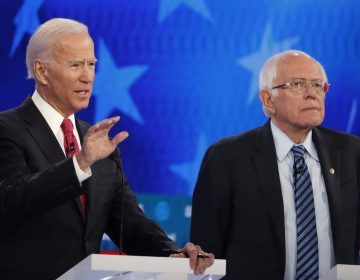Divide and conquer: The populist agenda
Populism is in the air, from Mr. Trump’s wild ride, to Brexit, to electoral challenges across Europe. But what is it?

People gather on the National Mall in Washington, Saturday, Sept. 16, 2017, to attend a rally in support of President Donald Trump. (AP Photo/Susan Walsh)
Populism is in the air, from Mr. Trump’s wild ride, to Brexit, to electoral challenges across Europe.
But what is it? On its face, the term sounds benign. According to Brittanica.com, populism “champions the common person as contrasted with elites” and criticizes existing political representation — so far, so good. The definition goes on to say that populism can describe democratic or authoritarian movements, with regressive, even sinister, overtones.
The National Constitution Center recently explored the topic and its implications for American democracy in a Town Hall discussion, The Rise of Populism, moderated by NCC President Jeffrey Rosen.
Panelist Jan-Werner Müller, Princeton University political theorist and author of “What is Populism?” noted that the term is being overused, that not all critics of elites are populists. “The danger in populism is not anti-elitism,” he said, “but anti-pluralism” — the difference being that the populist presents himself as being the only valid representative of the people.
Building rhetorical walls
Division and exclusion are important populist tools. Clear lines are drawn between an aggrieved majority and corrupt elites. Though populists profess to represent “the people,” they’re not inclusive. Rather, they deepen divisions between groups who may in truth have a lot in common. They are skilled at building rhetorical walls.
According to Müller, though populism presents itself as a grassroots movement, it is a creation of elites who weaponize electoral dissatisfaction against the current power structure.
They strengthen their position by undercutting competing groups and views, as with the calculated and relentless bashing of the mainstream media, and challenging academic and scientific knowledge. Populists don’t want followers to be reasonable, to listen to a range of ideas; they want alternatives dismissed immediately, completely. Compromise is treason.
Negating the message, devaluing the messengers
Panelists discussed the danger of orchestrated attacks on sources of verifiable information and societal institutions. They pinpointed the problem presented by technology, which has fractured the way Americans obtain information. Rather than working from a common set of facts, we curate information that conforms to what we already think and are astonished that others interpret issues in a totally different way.
Casting doubt on what is true and real makes it easier to isolate and persuade people, to erode common beliefs. Populism can take hold on the left or right, they said, noting that support for Sen. Bernie Sanders’ 2016 presidential bid had some populist elements.
The push to political extremes by the most vocal and active among us hollows out the legislative middle, which is where the real work of democracy takes place. With gerrymandered districts and the public square dominated by highly partisan rhetoric, it’s difficult for moderates to be elected or to get much done. As Dutch political scientist Cal Mudde has written, “Populism tends to get ugly when it gets into power.”
Don’t we know it.
Economic desperation fueling U.S. populism
What’s fueling the current rise of populism? In the United States, according to panelist Marc Gitenstein, former ambassador to Romania and current board member of The Biden Foundation, it’s driven by a “serious economic malaise,” a concentration of wealth in an ever-smaller fraction of the population, and reduced prospects for the rest of us.
“People are angry and desperate,” Gitenstein said. They are no longer confident of their economic future, or of opportunity for their children. Trump’s success sprang from this desperation, his bombast appealing to workers blindsided by technology, globalization, and the great recession, and whose plight has either been ignored or placated with empty promises.
“When you have polarization in the economy, you will see polarization in politics,” said panelist Edward Luce, Financial Times columnist and author of “The Retreat of Western Liberalism.” Technological advancement has contributed to both, enabling politicians to reach very specific interest groups who expect them to then do their bidding. “Technology has made campaigning easier, but governing harder,” Luce said.
The elephant in the room
Is there anything good about populism? Müller says it focuses attention on important issues overlooked by the establishment, such as economic inequality.
However, by exacerbating factional tensions and denigrating compromise, populism weakens the institutions on which civil societies rely to solve problems and settle disagreements. Instead, invective is hurled, resentments stoked, and nothing gets done. People on all sides lose sight of shared values and are less trusting of democratic systems and processes.
Will constitutionalism survive?
Noting that there are now 25 fewer democracies around the world than in the year 2000, and that most losses came through electoral means rather than overthrow, the panel assessed the future here.
Luce believes that the courts and reenergized media will constrain the current administration. He said Trump’s incompetence in the Oval Office is a saving grace, providing at least a temporary stumbling block to the advance of populism, but cautioned that other, more skillful representatives will follow if the United States does not address serious inequities in socioeconomic conditions.
Müller pointed out that to succeed, populists require cooperation from the establishment, in Trump’s case, the Republican party. Both major parties, however, continue to have significant philosophical divisions which could be exploited.
“In the end,” Gitenstein said, “what’s happened in the United States because of the way our institutions are built, is that we eventually accommodate legitimate beefs. That’s what has to happen here. [Groups supporting Trump] have a legitimate economic argument, and our system has to respond. If it does, our constitutional system survives. If it doesn’t, it won’t.”
How did this happen?
Exactly how did a billionaire become the front man for the economically disenfranchised? Gitenstein’s theory is that that Trump himself experienced discrimination at the hands of the New York elite. “He intuitively gets the alienation, and that’s why he can communicate with [his voters] in a gut-level way.”
It is a mistake, the panelists agreed, to dismiss Trump supporters as stupid, to condescendingly opine that “they voted against their own interests.” Setting aside Trump’s white supremacist support, the majority of Trump voters were simply desperate. Their anger was valid, and made them willing to support anyone promising to better their situation, even someone deplorable.
Where we go from here depends on us. “Every nation gets the government it deserves,” Joseph de Maistre said in 1811. If we can restore the political center, reestablish compromise as a cherished value rather than a form of treason, and listen to one another, perhaps those words won’t sound so scary in the future.
WHYY is your source for fact-based, in-depth journalism and information. As a nonprofit organization, we rely on financial support from readers like you. Please give today.



